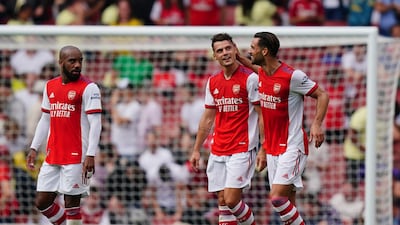In the space of a couple of hours, Arsenal’s midfield for the start of the season took on an unwanted look. For many supporters, anyway.
First came the blow that was greeted with unanimous disappointment: Thomas Partey limped off against Chelsea on Sunday. Then Mikel Arteta confirmed that Granit Xhaka is staying. “He is a player we rate and value so much,” he said. A potential new contract may underline that.
That assessment has not always been shared by the support. Xhaka’s Arsenal career may forever be remembered for the way he lost the captaincy, gesturing and mouthing abusive words at fans as they cheered his substitution. Yet three very different managers, in Arsene Wenger, Unai Emery and Arteta, have invariably picked him. A fourth, in Jose Mourinho, wanted to sign him for Roma this summer. A parting of the ways could have made sense; Arsenal have underachieved in Xhaka’s five seasons and each could have made a fresh start.
Instead, Xhaka is likely to resume his role as the cornerstone of a midfield deprived of the £50 million Partey. Last summer’s flagship buy is likely to miss not only the season opener at Brentford but the meetings with Chelsea and Manchester City. In his absence, Arsenal’s midfield could pale by comparison with those of the European and English champions.
That Partey is sidelined again furthers the impression he is injury-prone. Arsenal’s win percentage was slightly higher when he did not start last season, but his importance was nevertheless apparent. His display in the 1-0 win at Old Trafford was brilliant; rushing him back for December’s North London derby backfired when he was culpable for a 2-0 defeat while sustaining an injury that kept him out for a further five weeks.
The drop-off in quality between Partey and the alternatives has only increased his status. The paradox of Xhaka, perhaps, is that a disproportionate number of his goals come against elite sides and he produced arguably the performance of his life against the World Cup winners, when Switzerland eliminated France from Euro 2020.
If it prompted some to wonder why he has not touched such heights for Arsenal, it added to the enigma of a misunderstood multilingual midfielder. Wenger seemed to sign him as the defensive midfielder and then told him not to tackle when his disciplinary record was wretched.
Five players Arsenal should sign this summer





But Arteta has appreciated that he has been fundamental in Arsenal’s build-up. Xhaka made the most passes in the Premier League in 2017-18; he is a regular presence near the top of the charts. He and Partey were devised as a complementary partnership, with different attributes.
Minus Partey, Xhaka’s likeliest sidekick is Mohamed Elneny. Albert Sambi Lokonga, a summer signing from Anderlecht who was recommended to Arteta by Vincent Kompany, has impressed in pre-season. Lucas Torreira is back from a loan at Atletico Madrid where he won La Liga but was largely a substitute and feels surplus to requirements again.
Ainsley Maitland-Niles has played in his preferred position of midfield in pre-season: that managers from Arteta to Gareth Southgate to Ralph Hasenhuttl and Nuno Espirito Santo have all taken the view his running power makes him better equipped to play full-back or wing-back suggests the versatile 23-year-old is reluctant to take multiple hints.
But with the loanees Dani Ceballos and Martin Odegaard gone and not replaced, other than by the inexperienced Lokonga, with Joe Willock potentially off to Newcastle again, with Arteta choosing to commit much of his budget to the £50 million defender Ben White, Arsenal’s midfield resources may be more slender. Xhaka, the controversial constant, could be one of the first names on the teamsheet again.





